We hope you enjoyed reading this Simon & Schuster ebook.
Get a FREE ebook when you join our mailing list. Plus, get updates on new releases, deals, recommended reads, and more from Simon & Schuster. Click below to sign up and see terms and conditions.
CLICK HERE TO SIGN UP
Already a subscriber? Provide your email again so we can register this ebook and send you more of what you like to read. You will continue to receive exclusive offers in your inbox.
Thank you for downloading this Simon & Schuster ebook.
Get a FREE ebook when you join our mailing list. Plus, get updates on new releases, deals, recommended reads, and more from Simon & Schuster. Click below to sign up and see terms and conditions.
CLICK HERE TO SIGN UP
Already a subscriber? Provide your email again so we can register this ebook and send you more of what you like to read. You will continue to receive exclusive offers in your inbox.
More from the Author |
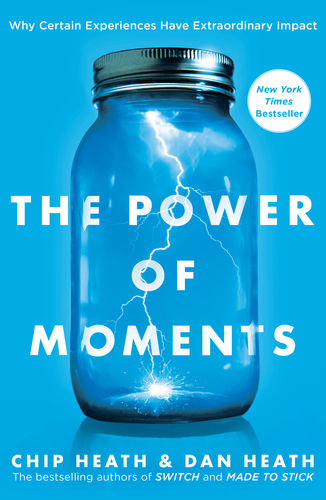 |
The Power of Moments |
Acknowledgments
First and foremost, thanks to the readers who provided feedback on an early draft of the book in the summer of 2019. You were incredibly generous with your time and your insights. The book got a lot better thanks to your suggestions and criticismsI am grateful.
There were many people whose wisdom and guidance I drew on repeatedly during this project, chief among them my brother and collaborator, Chip Heath, who contributed countless ideas to the book. Also on that list of advisors were Joe McCannon, Rosanne Haggerty, Nick Carnes, Maureen Bisognano, Becky and Christine Margiotta, Jeff Edmondson, Jens Ludwig, Farzad Mostashari, Justin Osofsky, Mike Roberto, and my colleagues at Dukes CASE, Erin Worsham and Cathy Clark.
Several thank-yous for specific expertise: Roosa Tikkanen of the Commonwealth Fund coached me through international patterns of health care spending; Byron Penstock helped me calculate Interfaces returns; Lyle Ungar tutored me on the components of life expectancy; Bridget Jancarz and Jennifer Blatz of StriveTogether turned me on to the CPS story; and Melissa Wiggins helped me collect reader feedback.
Thanks to the social sector leaders who flew to Durham to join me for a day of upstream brainstorming: Beth Sandor, Jennifer Blatz, Kate Hurley, Michelle Pledger, Anne Eidelman, Susan Rivers, Katie Hong, Talma Shultz, Alison Marczuk, Brigid Ahern, and Karthik Krishnan.
I am so thankful to Peter Griffin and Janet Byrne for their editing prowess. Any sloppy passages in the book are likely the result of me ignoring their advice.
I am forever grateful to my core team of researchers, whose fingerprints are all over this book: Evan Nesterak, Sarah Ovaska-Few, and Rachel Cohn. Week in, week out, you helped me push Upstream downstream. Thank you so much. And a sincere thanks as well to the other researchers who made major contributions: Emily Calkins, Stephanie Tam, Marian Bihrle Johnson, Julianna Garbo, and J. J. McCorvey.
For about 15 years, Ive been lucky to work with the peerless Christy Fletcher, who has a knack for giving the right feedback at the right time. Thanks to Christy and her team for their ongoing support. And its an honor to count Upstream among the first generation of books to be published by Avid Reader Press, co-helmed by my brilliant editor, Ben Loehnen. I am so appreciative, too, of the Avid team members who helped launch the book: Meredith Vilarello, Alex Primiani, Jordan Rodman, and Jofie Ferrari-Adler.
A heartfelt thank you to the Heath clan and the Albertson clan for your constant love and support. And I would be nowhere without my wonder of a wife, Amanda, and our daughters, Josephine and Julia.
ALSO BY CHIP AND DAN HEATH
Made to Stick: Why Some Ideas Survive and Others Die
Switch: How to Change Things When Change Is Hard
Decisive: How to Make Better Choices in Life and Work
The Power of Moments: Why Certain Experiences Have Extraordinary Impact
Appendix 1 Scaling Programs in the Social Sector
As mentioned in chapter 7, the Becoming a Man (BAM) program delivered very positive results in the first 2 RCTs and much weaker results in a third study, one which involved a much larger student population. The data on BAM suggests that the more teenagers who participate in BAM, the lower the average impact and the greater the variability in their experience.
Simply putand this is true across the social sectorwe dont know very much about how to scale up successful programs. Imagine a world with only one McDonalds outlet. A world where Starbucks stayed in Seattle and never grew. Thats essentially the norm in social science. You would be hard-pressed to find a specific social program that has been franchised as successfully as KFC. (Kindergarten is one possible example.)
Theres good reason for that difficulty, of course. There are probably six billion people who could be properly trained to fry up a batch of fries. How many people could aspire to do what Tony D does? Six million1 in 1,000if were lucky? When it comes to the messiness and complexity of human lives, its very hard to deliver solutions as reliably as businesses deliver products.
More and more people are starting to wrestle with this question of scale, but its still very, very early days, said the Crime Labs Jens Ludwig. Were very far from knowing: Heres the recipe for getting this social program that works really well for one thousand kids to work really well for five thousand kids.
My own take is that this is largely an unsolvable problemthat there are few programs for improving the lives of human beings that are as easy to reproduce on a large scale as fried chicken or lattes. (Here Im thinking of programs in the sense of BAMthose that rely on people providing services to other people. Certainly there are more systemic approaches, from Social Security to stoplights, that scale very well indeed.) And because of that, in the social sector, weve eventually got to shift from a mind-set of scaling a specific program by reproducing it faithfully to owning a problem and adapting a program as needed to achieve results. For more on that idea, see my Pill vs. Scoreboard rant toward the end of chapter 13.
About the Author

DAN HEATH and his brother, Chip, have written four New York Times bestselling books: Made to Stick, Switch, Decisive, and The Power of Moments. Heath is a senior fellow at Duke Universitys CASE center, which supports entrepreneurs fighting for social good. He lives in Durham, North Carolina. The Heath brothers books have sold more than 3 million copies worldwide and have been translated into 33 languages.
SimonandSchuster.com
www.SimonandSchuster.com/Authors/Dan-Heath
 @avidreaderpress
@avidreaderpress  @avidreaderpress
@avidreaderpress  @avidreaderpress
@avidreaderpress
Note from Author on Sourcing
Over 300 interviews were conducted for this book. If a quote appears without a source listed (Smith said), then its from one of those interviews. If a quote comes from another source, that source is made explicit (as Smith told the New York Times
Next page
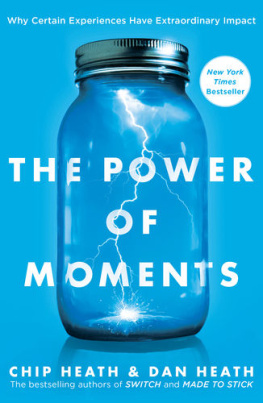
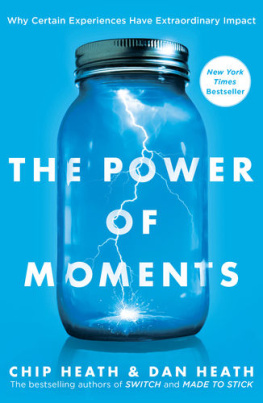


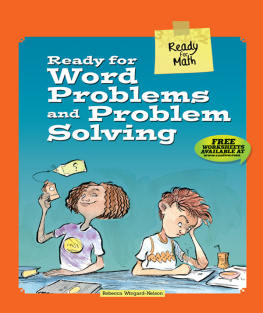


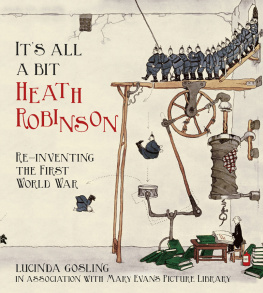
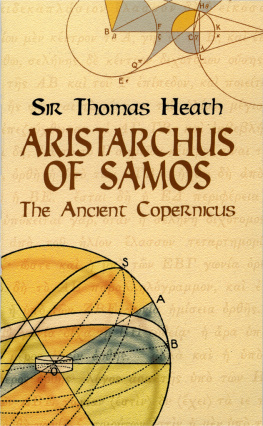
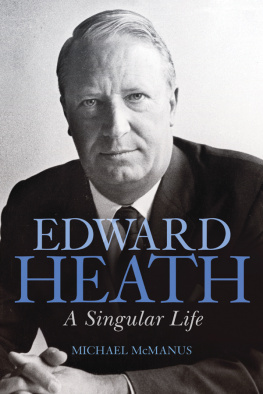



 @avidreaderpress
@avidreaderpress  @avidreaderpress
@avidreaderpress  @avidreaderpress
@avidreaderpress